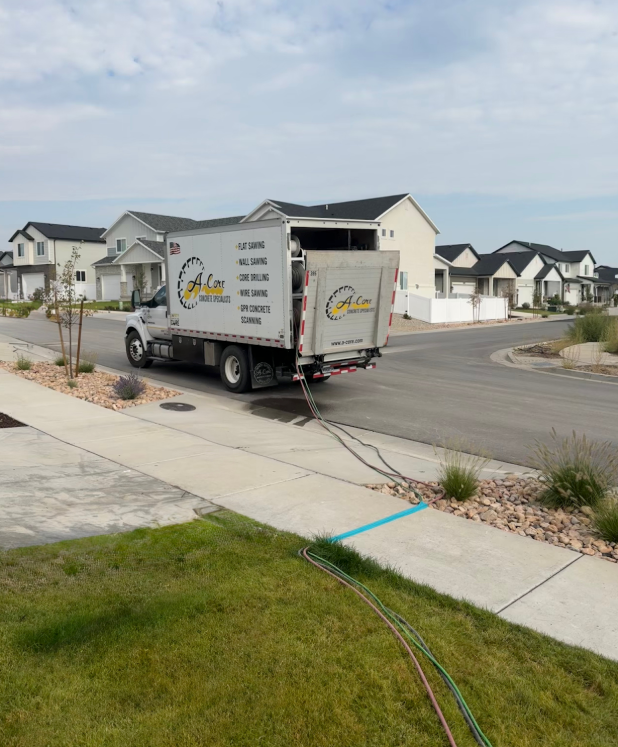Driveway Expansion Made Easy: When and Why to Call in A-Core’s Sawing Crew
- Sep 3, 2025
- 4 min read
Updated: Oct 31, 2025
Expanding your driveway can dramatically improve your home’s functionality, curb appeal, and property value.
Whether you're tired of playing musical cars, dealing with cracked pavement, or preparing for a new RV or work vehicle, knowing when and how to expand your driveway makes all the difference. This guide will walk you through the key signs it's time for an upgrade—and why calling in a precision sawing crew like A-Core’s can save you time, stress, and long-term repair costs.
Let’s start by understanding why so many homeowners and businesses are expanding their driveways today.

Why Homeowners and Businesses Expand Their Driveways
Driveway expansions are no longer just about convenience. They’re often a necessity. As families grow and households acquire more vehicles, the original driveway often becomes too small to accommodate everyone’s transportation needs. The same goes for businesses where staff or customer parking spills beyond capacity, creating safety issues or zoning conflicts.
More Vehicles, More Space
The most common reason homeowners expand their driveways is to make room for additional vehicles. Whether it’s a new teen driver in the house, a work truck, or a recreational vehicle like a boat or trailer, squeezing multiple vehicles into a single-lane driveway quickly becomes a daily frustration.
Improving Accessibility and Curb Appeal
In some cases, a wider or reshaped driveway enhances the overall appearance of the property. A broader entrance or an added parking bay can improve accessibility and reduce wear on the front lawn or street edge. For homes in HOA communities or with resale in mind, the added curb appeal and order can be a major selling point.
Commercial and Multi-Use Properties
For businesses, driveway expansion can mean the difference between chaos and control. Delivery vehicles, service trucks, and employee parking all demand more space. Expanding a commercial driveway is often part of scaling operations or meeting local code requirements.
No matter the reason, the goal is the same: more functionality, better flow, and a surface built to last.
Signs It’s Time to Expand Your Driveway
Sometimes, the need for driveway expansion creeps up slowly—other times, it’s obvious. If you're unsure whether it's time to widen or extend your driveway, a few clear signs can help you decide.
1. Constant Vehicle Juggling
If you're regularly playing “car shuffle” just to leave for work or school, your current driveway is probably undersized for your household. Having to park in the street, move cars frequently, or block other vehicles increases the risk of accidents and damages.
2. New Additions to the Family Fleet
Whether it's a teenager’s first car, a company truck, or a new RV, any new vehicle that doesn’t fit comfortably within your existing driveway is a red flag. Oversized or specialty vehicles, in particular, require more width or depth than traditional driveways provide.
3. Encroachment and Lawn Damage
Do you often find yourself parking partially on the grass or edging into the landscaping? Not only does this damage your yard, but it also shortens the lifespan of the concrete by creating uneven load points. Over time, this can lead to cracking or sinking.
4. Visible Stress or Cracking
Driveways designed for one or two vehicles can begin to show signs of wear when overloaded. Cracks, flaking, or uneven settling may indicate your surface is under more stress than it was designed to handle, and that expansion could solve more than just space issues.
What’s Involved in a Driveway Expansion Project
Expanding your driveway is a structured process that ensures durability, drainage, and visual harmony with your existing layout. If you're doing a small extension or a full-width overhaul, there are several essential steps to get it done right.
1. Site Assessment and Permitting
Every successful driveway expansion starts with a proper site evaluation. This includes measuring the available space, identifying underground utilities, and ensuring the new section complies with local zoning laws and HOA guidelines. In most municipalities, you'll need a permit before any work begins.
2. Excavation, Grading, and Drainage
After the green light from permitting, the site must be cleared and graded. Proper grading ensures water runoff doesn't pool on or around the driveway, which is critical for preventing long-term cracking and erosion. If drainage is ignored, the lifespan of your new surface could be severely reduced.
3. Sub-Base and Reinforcement
Once the area is prepared, a solid sub-base, typically compacted gravel, is laid to provide a stable foundation. Reinforcing steel or mesh may also be added to increase strength, especially for driveways expected to carry heavier vehicles.
4. Sawing and Integration
This is where professional sawing teams like A-Core come in. Precision cutting allows the new slab to be tied seamlessly into the old one. Clean edges and matched control joints reduce stress points and help prevent future cracking where the new and old concrete meet.
5. Pouring, Finishing, and Curing
Finally, the concrete is poured, leveled, and finished to match the existing surface. Curing is crucial. It typically takes several days to a week before the driveway can handle vehicle weight. During this time, the surface must be kept moist and undisturbed.
DIY options might cut costs, but skipping professional support, especially during the sawing and sub-base phases, can lead to costly repairs down the line. A properly managed expansion adds long-term value without structural compromises.
Ready to expand your driveway the right way?
Reach out to A-Core Concrete Specialists today to schedule a consultation. With headquarters in Murray, Utah and locations across the Mountain West and Southwest, including Denver, Albuquerque, Boise, and Fort Worth, A-Core has the local presence and national expertise to get the job done right.





Comments